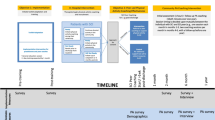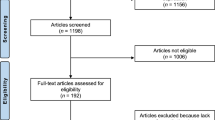Abstract
Study design
Qualitative study.
Objectives
To formulate recommendations for standards of physiotherapy care for people with complete traumatic paraplegia in India using a Delphi methodology.
Setting
India.
Methods
Twenty-three physiotherapy experts were invited to participate in an online consensus process. Fourteen (n = 14) of 23 physiotherapy experts from India accepted an invitation to participate in an online consensus development exercise (Response rate—60.86%). Four rounds of consensus meetings were conducted which involved posting the quotations from a previous study on expectations of people with paraplegia to obtain perceptions of physiotherapy experts in round 1, retrieving codes/code groups from round 1, posting these code groups in rounds 2 and 3 for experts’ agreement/disagreement, the preparation of the draft of recommendations, and posting it in round 4 for experts’ opinion. Data were analyzed using descriptive statistics and ATLASti software for qualitative data analysis.
Result
Recommendations for physiotherapy care for persons with complete traumatic paraplegia in India are presented.
Conclusions
Education to patients and/or caregivers regarding care post injury is one of the important recommendations by physiotherapy experts. It is emphasized that the subjective assessment of the patients, including their needs and preferences, is equally important as that of their objective assessment. Physiotherapy students and practicing physiotherapists must also enhance their knowledge to provide optimal physiotherapy care to people with paraplegia.
Similar content being viewed by others
Log in or create a free account to read this content
Gain free access to this article, as well as selected content from this journal and more on nature.com
or
References
Chhabra HS, Arora M. Demographic profile of traumatic spinal cord injuries admitted at Indian Spinal Injuries Centre with special emphasis on mode of injury: a retrospective study. Spinal Cord. 2012;50:745–54.
Chhabra HS, Arora M. Neglected traumatic spinal cord injuries: causes, consequences and outcomes in an Indian setting. Spinal Cord. 2013;51:238–44.
Schroeder ST, LaBarbera J, McDowell S, Zanca JM, Natale A, Mumma S, et al. The SCIRehab project: treatment time spent in SCI rehabilitation. Physical therapy treatment time during in-patient spinal cord injury rehabilitation. J Spinal Cord Med. 2011;34:149–61.
Van Langeveld SA, Post MW, Asbeck SWV, Gregory M, Halvorsen A, Rijken H, et al. Comparing content of therapy for people with a spinal cord injury in post-acute in-patient rehabilitation in Australia, Norway and Netherland. Phys Ther. 2011;91:210–24.
Trylinska-Tekielska E. Questionnaire of expectation patient-physiotherapist (QEPP). Adv Pall Med. 2012;11:56–61.
Harvey LA, Adams R, Chu J, Batty J, Barratt D. A comparison of patients’ and physiotherapists’ expectations about walking post spinal cord injury: a longitudinal cohort study. Spinal Cord. 2012;50:548–52.
Gupta N, Raja K. Expectations of persons with paraplegia regarding their care in India—a qualitative study. Spinal Cord Ser Cases. 2017;3:17042. https://doi.org/10.1038/scsandc.2017.42.
Okoli C, Pawlowski SD. The Delphi method as a research tool: an example, design considerations and applications. Inf Manag. 2004;42:15–29.
Lateef F. Patient expectation and the paradigm shift of care in emergency medicine. J Emerg Trauma Shock. 2011;4:163–7.
Chhabra HS, Batra S. Spinal cord injury and its impact on the patient, family and the society. Int J Recent Surg Med Sci. 2016;2:1–4.
Harvey LA. Physiotherapy rehabilitation for people with spinal cord injuries. J Physiother. 2016;62:4–11.
Gupta N, Raja K. Physiotherapy care for adults with paraplegia due to traumatic causes: a review. Disabil CBR Incl Dev. 2016;27. https://doi.org/10.5463/DCID.v27i3.512.
Chhabra HS, Sharma S, Arora M. Challenges in comprehensive management of spinal cord injury in India and in the Asian Spinal Cord network region: findings of a survey of experts, patients and consumers. Spinal Cord. 2018;56:71–7.
Khanna M, Gowda GS, Bagevadi VI, Gupta A, Kulkarni K, Shyam RPS, et al. Feasibility and Utility of Tele-Neurorehabilitation Service in India: Experience from a Quaternary Center. J Neurosci Rural Pr. 2018;9:541–4.
International Standards for Neurological Classification of SCI (ISNCSCI) Worksheet. 2019. https://asia-spinalinjury.org/international-standards-neurological-classification-sci-isncsci-worksheet/.
Ditunno JF Jr, Ditunno PL, Scivoletto G, Patrick M, Dijkers M, Barbeau H, et al. The Walking Index for Spinal Cord Injury (WISCI/WISCI II): nature, metric properties, use and misuse. Spinal Cord. 2013;51:346–55.
Wheelchair Skill Test. 2017. https://scireproject.com/outcome-measures/outcome-measure-tool/wheelchair-skills-test-wst/#1467983894177-6b9fb7a3-f550.
Pressure Ulcer Scale for Healing. 2013. https://www.sralab.org/rehabilitation-measures/pressure-ulcer-scale-healing.
Kirchberger I, Cieza A, Biering-Sørensen F, Baumberger M, Charlifue S, Post MW, et al. ICF core sets for individuals with spinal cord injury in the early post-acute context. Spinal Cord. 2010;48:297–304.
Cieza A, Kirchberger I, Biering-Sørensen F, Baumberger M, Charlifue S, Post MW, et al. ICF core sets for individuals with spinal cord injury in the long-term context. Spinal Cord. 2010;48:305–12.
Acknowledgements
I would like to acknowledge Dr Kavitha Raja, Principal, JSS College of Physiotherapy, Mysore for guiding me in this study and Dr Priyanshu Rathod, Director, School of Physiotherapy, R K University for his constant support and encouragement.
Contributors (panel of physiotherapy experts)
Dr (Prof.) Lata Parmar, PT, Ph.D., Principal, College of Physiotherapy, Sumandeep Vidyapeeth, Vadodara, Gujarat, India. Dr Raju K. Parasher, PT, EdD, Director/Principal, Amar Jyoti Institute of Physiotherapy, Karkardooma, Delhi, India. Mrs Vimal Telang, Lecturer (Physiotherapy), All India Institute of Physical Medicine and Rehabilitation (AIIPMR), Mumbai, Maharashtra. Dr Yagna Shukla, PT, Ph.D., Government Physiotherapy College and Government Spine Institute, Civil Hospital, Ahmedabad. Andrew Babu, Senior Reader & Head of Physiotherapy Unit, PMR Department, CMC Hospital, Vellore, Tamilnadu, India. Dr Chitra Kataria, Head of Rehabilitation Services, Indian Spinal Injuries Centre, Delhi, India. Prof. R. Harihara Prakash, Principal & Head, K.M. Patel Institute of Physiotherapy, Karamsad, Anand, Gujarat, India. John Solomon, PT, Ph.D., Associate Professor, Department of Physiotherapy, School of Allied Health Sciences, Manipal University, Manipal. Karthik Babu, PT, Ph.D. Associate Professor, Department of Physiotherapy, School of Allied Health Sciences, Manipal University, Manipal. Harpreet Singh Sachdeva, Senior Physiotherapist, AlIMS, Delhi, India. Dr Sayli Thuse, Professor and HOD, Neurophysiotherapy, MAEER’s Physiotherapy College, Talegaon Dabhade, Pune, Maharashtra, India. Dr Ashok Trivedi, Physiotherapist, Jaya Rehabilitation Centre, Bidada, Kutch, Gujarat, India. Dr Snehal K. Patel, Physiotherapist, Paraplegic Foundation, Mumbai, Maharashtra, India. Dr Uthra Mohan, Physiotherapist, Paraplegic Foundation, Mumbai, Maharashtra, India.
Author information
Authors and Affiliations
Corresponding author
Ethics declarations
Conflict of interest
The author declares that she has no conflict of interest.
Additional information
Publisher’s note Springer Nature remains neutral with regard to jurisdictional claims in published maps and institutional affiliations.
Rights and permissions
About this article
Cite this article
Gupta, N. Recommendations for standards of physiotherapy care following complete traumatic paraplegia in India. Spinal Cord Ser Cases 6, 14 (2020). https://doi.org/10.1038/s41394-020-0263-z
Received:
Revised:
Accepted:
Published:
Version of record:
DOI: https://doi.org/10.1038/s41394-020-0263-z



